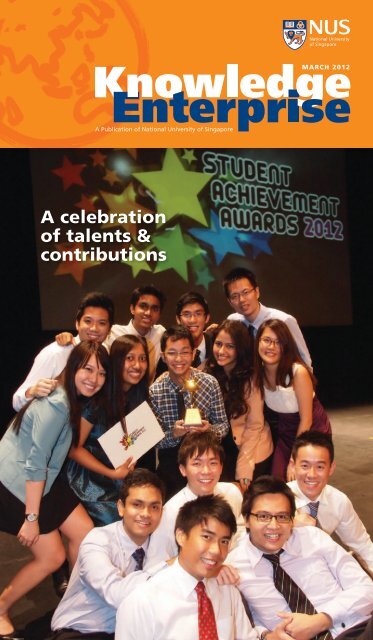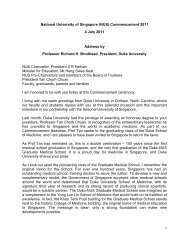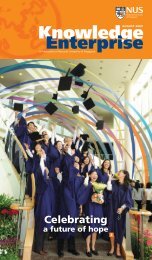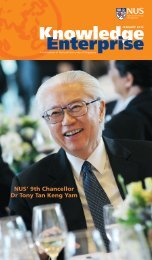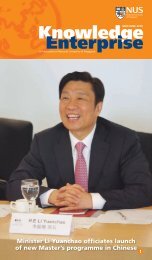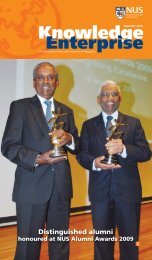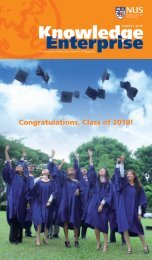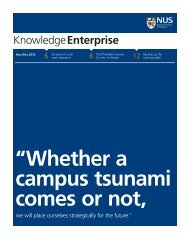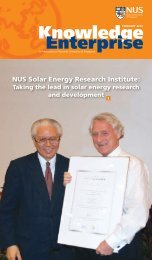Download PDF - NewsHub - National University of Singapore
Download PDF - NewsHub - National University of Singapore
Download PDF - NewsHub - National University of Singapore
Create successful ePaper yourself
Turn your PDF publications into a flip-book with our unique Google optimized e-Paper software.
MARCH 2012<br />
A Publication <strong>of</strong> <strong>National</strong> <strong>University</strong> <strong>of</strong> <strong>Singapore</strong><br />
A celebration<br />
<strong>of</strong> talents &<br />
contributions
Passion in public service<br />
Former NUS Chancellor Mr S R Nathan, <strong>Singapore</strong>’s<br />
longest serving President, was in public service<br />
for more than 50 years, and remains till today a<br />
strong advocate <strong>of</strong> duty and service to the nation.<br />
Sharing his life experiences at NUS’ U@live forum<br />
on 8 February 2012, he related with conviction<br />
one lesson he had learnt from his university days,<br />
namely, that no one should be written <strong>of</strong>f.<br />
Considering the context <strong>of</strong> <strong>Singapore</strong>, where the<br />
community was brought together by geography<br />
rather than a common culture, language and<br />
history, he said that his generation provided the<br />
landing space and the younger generation was<br />
like the pilgrim fathers having just landed. For<br />
them, he had this message: “The land ahead is<br />
yours and you have to mould it. You have to build<br />
on it and you have to ask yourself, ‘Why am I<br />
here? Why have we come?’ … The moulding <strong>of</strong><br />
that nation is your responsibility.”<br />
Among other views and stories he shared, he<br />
also answered questions on his presidency and<br />
personal philosophies. When asked about his idea<br />
<strong>of</strong> good leadership, he said: “I would certainly<br />
like to see leaders who are committed to the<br />
progress <strong>of</strong> their community, who are prepared to<br />
engage the community, and uplift it and bring it<br />
forward.”<br />
Mr Nathan in good spirits at U@live<br />
He believed that each person is endowed with a set<br />
<strong>of</strong> abilities and will have something to contribute.<br />
He told the audience, “All <strong>of</strong> us, like our fingers,<br />
are not equal. Don’t expect others to be like you.<br />
Tolerate the differences. Show compassion where<br />
it’s necessary. Your duty is to uplift people.”<br />
Mr Nathan, NUS’ 8th Chancellor, was among the<br />
pioneer batch <strong>of</strong> eight social work students at the<br />
<strong>University</strong> <strong>of</strong> Malaya, which later became NUS. As<br />
an active alumnus <strong>of</strong> the <strong>University</strong>, he continues<br />
to support its activities and engage students<br />
through gracing events like U@live.<br />
U@live, organised by NUS alumni and the Office<br />
<strong>of</strong> Alumni Relations and hosted by Mr Viswa<br />
Sadasivan, is a monthly forum featuring<br />
outstanding members <strong>of</strong> the NUS community<br />
who have been an inspiration in their passion and<br />
dedication to the betterment <strong>of</strong> society.<br />
At the end <strong>of</strong> the day, the beneficiaries <strong>of</strong> what you do are people<br />
at all levels <strong>of</strong> society. … That is the attraction <strong>of</strong> public service.<br />
– Mr Nathan<br />
NUS Career Fair a hit with students<br />
and employers<br />
Held on 2 and 8 February this year, the NUS Career<br />
Fair saw over 9,000 students in attendance and<br />
drew a record number <strong>of</strong> 176 employers across<br />
various sectors. Among the participating companies<br />
were 54 first-timers which included brand names<br />
such as Google, Coca-Cola and Charles & Keith.<br />
The employers were looking to fill a broad range<br />
<strong>of</strong> openings, from pr<strong>of</strong>essional employment to<br />
internships and research scholarships.<br />
with 26 NUS scholars. This new programme,<br />
designed for top talents and aspiring leaders, seeks<br />
to impart leadership principles and skills through<br />
experiential learning, self-initiated projects and<br />
mentorship by industry leaders and practitioners.<br />
The NUS Career Fair is organised by the <strong>University</strong>’s<br />
Career Centre and Office <strong>of</strong> Student Affairs.<br />
KNOWLEDGE ENTERPRISE<br />
2<br />
Noting the increased interest in NUS’ Career Fair<br />
among employers and continued strong demand<br />
for NUS graduates in the job market, Vice Provost<br />
(Student Life) Pr<strong>of</strong>essor Tan Tai Yong said: “We<br />
are greatly encouraged to know that employers<br />
view our fresh graduates as strategic hires in<br />
rejuvenating their current workforce, and a<br />
pipeline for future managerial roles.”<br />
At the Fair’s opening ceremony, Pr<strong>of</strong> Tan spoke on<br />
the <strong>University</strong>’s talent development programme<br />
and highlighted a new initiative, the NUS Future<br />
Leaders Programme, piloted in the last semester<br />
NUS Career Fair 2012 attracted many popular brands on a<br />
lookout for fresh talents
Celebrating a multidimensional<br />
NUS experience<br />
All 83 nominees <strong>of</strong> the NUS Student Achievement<br />
Awards (SAA) 2012 which took place on<br />
17 February were winners already. They had all<br />
tasted success in their endeavours, learnt much<br />
from their voluntary or competitive experiences,<br />
and made significant impact on their community.<br />
Every one <strong>of</strong> them is a shining example <strong>of</strong> the<br />
rich and dynamic multidimensional varsity life<br />
at NUS.<br />
Citing the diverse activities <strong>of</strong>fered by the<br />
<strong>University</strong> which encourage informal learning<br />
and talent development beyond a classroom<br />
environment, NUS Deputy President (Academic<br />
Affairs) and Provost Pr<strong>of</strong>essor Tan Eng Chye<br />
said at the awards ceremony that “it reflects<br />
our strong belief that preparing future ready<br />
candidates extends beyond the academic sphere.”<br />
He added that students who had taken advantage <strong>of</strong><br />
such learning opportunities would develop desired<br />
qualities <strong>of</strong> mind and character, namely, resilience,<br />
teamwork, confidence, interpersonal and leadership<br />
skills, which would prepare them well for a fulfilling<br />
life and career.<br />
The celebration <strong>of</strong> student talents and contributions<br />
outside the academic curriculum at the 7th SAA<br />
organised by the Office <strong>of</strong> Student Affairs was<br />
made more exciting this year with the results being<br />
revealed only at the ceremony itself. Before an<br />
expectant crowd <strong>of</strong> some 600 students, staff and<br />
supporters, a total <strong>of</strong> 21 group and 12 individual<br />
winners were announced, and greeted by<br />
thunderous applause from the audience. These 33<br />
winners came from across three award categories:<br />
Competitions, Community Projects and Distinguished<br />
Leadership. They were joined by 14 merit winners<br />
and about 60 societies and interest groups who<br />
received Special Achievements certificates. Special<br />
Commendation awards were also presented to the<br />
NUS Students’ Union and 17 participating bodies <strong>of</strong><br />
Rag and Flag 2011.<br />
Thanking the award recipients and nominees for<br />
their efforts, sacrifices and contributions, Dean<br />
<strong>of</strong> Students Associate Pr<strong>of</strong>essor Tan Teck Koon<br />
expressed that the <strong>University</strong> is immensely proud<br />
<strong>of</strong> them and urged everyone to look beyond the<br />
recognition – to keep up their good work and<br />
continue to enjoy the satisfaction that comes from<br />
pursuing and accomplishing what they believe in.<br />
Pr<strong>of</strong> Tan Eng Chye (left) presenting the award to Alvin Lim,<br />
the only individual winner in the Competitions category<br />
The WorldMUN <strong>Singapore</strong> 2011 Host Team, one <strong>of</strong> the<br />
winning groups in the Community Projects category<br />
Some SAA 2012 winners …<br />
Competitions<br />
• Alvin Lim Shan Jia<br />
Winner <strong>of</strong> the Traders Trophy Competition<br />
(<strong>Singapore</strong>) who represented the nation in the<br />
worldwide finals.<br />
• NUS FSAE 2011 team<br />
Produced the most well-designed race car<br />
beating 121 international teams at the Formula<br />
Society <strong>of</strong> Automotive Engineers competition in<br />
Michigan.<br />
Community Projects<br />
• WorldMUN <strong>Singapore</strong> 2011 Host Team<br />
Co-organised the first World Model United<br />
Nations Conference in Southeast Asia along with<br />
Harvard <strong>University</strong> students. The conference saw<br />
over 2,000 participants from 60 cities around the<br />
world.<br />
• NUS Students’ Union Students Against<br />
Violation <strong>of</strong> the Earth (NUSSU SAVE)<br />
Champion <strong>of</strong> green initiatives around campus<br />
such as recycling, tree-planting and energysaving<br />
projects.<br />
• Eus<strong>of</strong>f Voluntary Corps<br />
Fosters effective community volunteerism among<br />
Eus<strong>of</strong>f Hall residents through <strong>of</strong>fering practical<br />
help to the elderly in low income homes, giving<br />
tuition to residents <strong>of</strong> a children’s home, and<br />
providing life skills training to the mentally<br />
disabled.<br />
Distinguished Leadership<br />
• Dominic Lim Wan Xian<br />
<strong>Singapore</strong>’s representative to the UNESCO Asian<br />
Youth Forum held in Gwangju, Korea, who is<br />
involved in various national youth committees.<br />
Founded and leads the SPLAT! community arts<br />
movement which now has a volunteer pool <strong>of</strong><br />
about 800 people, including youths-at-risk and<br />
ex-youth <strong>of</strong>fenders.<br />
• Mah Yi Xin<br />
Project Director <strong>of</strong> the Kent Ridge Ministerial<br />
Forum in April 2011 which featured <strong>Singapore</strong><br />
Prime Minister Lee Hsien Loong. One <strong>of</strong> the<br />
four delegates who represented <strong>Singapore</strong> in<br />
the ASEAN-China Youth Leaders’ Symposium in<br />
Phnom Penh, Cambodia, last June.<br />
MARCH 2012<br />
3
KNOWLEDGE ENTERPRISE<br />
ACCOLADES<br />
NUS MBA maintains 23rd placing in the<br />
world<br />
NUS Business School’s Master <strong>of</strong> Business<br />
Administration (MBA) programme has once again<br />
been placed 23rd in the world by the closely<br />
watched Financial Times (FT) Global MBA Rankings<br />
2012. It has retained this spot, the highest ranking<br />
attained by a <strong>Singapore</strong> university, for the second<br />
year running.<br />
The School also achieved exceptional results<br />
in several categories. Post-MBA salaries <strong>of</strong> its<br />
graduates increased by 185% over pre-MBA<br />
salaries, showing the high value derived from this<br />
MBA. The School also maintained its 9th placing<br />
globally for its graduates’ international mobility,<br />
which reflects worldwide demand from employers<br />
for NUS MBA graduates.<br />
Said the School’s Dean, Stephen Riady<br />
Distinguished Pr<strong>of</strong>essor Bernard Yeung: “These<br />
rankings are a recognition that the NUS Business<br />
School continues to meet the needs <strong>of</strong> our<br />
students and employers, while providing a<br />
rigorous education. We shall continue to strive<br />
to be a business school that produces impactful<br />
ideas, graduates who are well-received, and allrounded<br />
business leaders with an understanding<br />
and appreciation <strong>of</strong> Asia.”<br />
The NUS Executive MBA also fared well in the FT<br />
Rankings, with the School’s Asia-Pacific EMBA<br />
ranked 19th and its double degree with the<br />
<strong>University</strong> <strong>of</strong> California Los Angeles at 9th place.<br />
Business students ace case competitions<br />
NUS Business School had multiple reasons to<br />
celebrate, with successive wins clinched by its<br />
student teams at recent case competitions.<br />
Undergraduates Lin Xun, Peh Che Min, Endi<br />
Asmira and Goh Aik Joon formed a formidable<br />
team against the other participants from 11<br />
internationally renowned business schools vying<br />
for the <strong>University</strong> <strong>of</strong> Auckland’s Champions<br />
Trophy in February 2012. The foursome from NUS<br />
came in first in all four rounds <strong>of</strong> the competition<br />
and finally took home the winning trophy.<br />
Garnering the most votes from the audience, they<br />
also received the People’s Choice Award.<br />
Their win was exceptional as the participating<br />
teams had all clinched top awards at various<br />
international case competitions, which qualified<br />
them for the event. The NUS team had won the<br />
Copenhagen Business School Case Competition<br />
and finished among the top three in the<br />
Scotiabank and NUS-DBS International Case<br />
Competitions. Winning this Champions Trophy<br />
thus made the team the winner <strong>of</strong> winners!<br />
Student teams representing NUS Business School<br />
at the fifth <strong>University</strong> Investment Research<br />
Competition and CaseIT 2012 also did extremely<br />
well. Team REI, comprising Alvin Lim, Amanda<br />
Lai, Chong Li Yue, Mervyn Yee and Timothy Koh,<br />
emerged as the national champion for the former<br />
event, last won by NUS too. Each team member<br />
received a CFA scholarship and an opportunity to<br />
participate in the Asia-Pacific Regional Finals in<br />
Hong Kong.<br />
Business students Kenneth Heng and Yuan Yi,<br />
together with Aalok Chhabria from the School<br />
<strong>of</strong> Computing, also did NUS proud as the first<br />
runners-up in Case IT 2012. Held in Canada,<br />
CaseIT is an annual competition with a strong<br />
Management Information Systems focus, designed<br />
to find the best and brightest in strategic IT case<br />
analysis.<br />
(From left) Goh<br />
Aik Joon, Pr<strong>of</strong><br />
Sai Yayavaram<br />
(faculty advisor),<br />
Lin Xun, Peh Che<br />
Min and Endi<br />
Asmira bearing<br />
the Champions<br />
Trophy and the<br />
People’s Choice<br />
Award (far right)<br />
4
NUSNNI Director receives prestigious<br />
George E Pake Prize<br />
Pr<strong>of</strong>essor Thirumalai Venkatesan,<br />
Director <strong>of</strong> the NUS Nanoscience<br />
and Nanotechnology Initiative and<br />
NanoCore, has been awarded the 2012<br />
George E Pake Prize from the American<br />
Physical Society (APS). He received this<br />
prize at the APS March 2012 meeting<br />
in Boston, Massachusetts, US, in<br />
recognition <strong>of</strong> his exemplary scientific<br />
career in research, industrial leadership,<br />
and guidance <strong>of</strong> new generations <strong>of</strong><br />
physicist in the creation <strong>of</strong> new ventures<br />
by innovation.<br />
ACCOLADES<br />
Among the world’s top 100 most<br />
cited physicists, Pr<strong>of</strong> Venkatesan has<br />
published over 500 papers in the field<br />
<strong>of</strong> oxide films and hetero structures. He<br />
is well-known as a pioneer in oxide electronics and<br />
inventor <strong>of</strong> the pulsed laser deposition process.<br />
Neocera, a company he founded in 1989, is now<br />
recognised globally for PLD systems and magnetic<br />
field imaging magma systems. He has also helped<br />
many <strong>of</strong> his students and researchers to set up<br />
companies.<br />
Pr<strong>of</strong> Venkatesan (left) receiving the prize certificate from Stanford<br />
<strong>University</strong> Pr<strong>of</strong>essor Robert Byer, Chairman <strong>of</strong> the APS Prize Committee<br />
Endowed by the Xerox Corporation in 1983, the<br />
George E Pake Prize was established to recognise<br />
and encourage outstanding physicists for their<br />
research accomplishments and leadership in<br />
developing the industry. Among its recipients were<br />
many highly acclaimed physicists, including Nobel<br />
Laureate and former Bell Labs President Arno Allan<br />
Penzias.<br />
• Provost’s Chair Pr<strong>of</strong>essor Deng Yongheng, also<br />
NUS Institute <strong>of</strong> Real Estate Studies Director,<br />
was elected the Second Vice President <strong>of</strong> the<br />
American Real Estate and Urban Economics<br />
Association (AREUEA). AREUEA is the world’s<br />
leading academic association in the field <strong>of</strong> real<br />
estate finance and<br />
urban economics.<br />
Pr<strong>of</strong> Deng is the first Asian<br />
Second Vice President <strong>of</strong><br />
AREUEA<br />
Pr<strong>of</strong> Deng is the first<br />
person outside <strong>of</strong><br />
North America to<br />
assume this position<br />
in the 48 years <strong>of</strong><br />
AREUEA’s history.<br />
This election<br />
reflected growing<br />
awareness <strong>of</strong> Asia<br />
as a new global<br />
economic centre as<br />
well as a recognition<br />
<strong>of</strong> NUS’ leading<br />
role in real estate<br />
education, finance and urban economics<br />
research.<br />
Said Pr<strong>of</strong> Deng: “This is a challenging period<br />
for the global economy and real estate<br />
markets, and I look forward to raising greater<br />
international interest on vital issues relating to<br />
real estate and urban development in Asia and<br />
around the world. The next few years will be<br />
a time <strong>of</strong> major paradigm shifts as the world<br />
explores new models <strong>of</strong> growth, development<br />
and sustainability. I hope a multidisciplinary<br />
approach, which NUS excels in, would <strong>of</strong>fer<br />
distinctive insights into matters <strong>of</strong> such great<br />
complexity.”<br />
• Mechanobiology Institute Director Michael<br />
Sheetz, Distinguished Pr<strong>of</strong>essor at the NUS<br />
Department <strong>of</strong> Biological Sciences and William R<br />
Kenan Junior Pr<strong>of</strong>essor at Columbia <strong>University</strong>,<br />
will be presented with the 11th annual Wiley<br />
Prize in Biomedical Sciences at Rockefeller<br />
<strong>University</strong>, New York, in April 2012. He will be<br />
sharing the award with Pr<strong>of</strong>essor James Spudich<br />
from Stanford <strong>University</strong><br />
and Pr<strong>of</strong>essor Ronald<br />
Vale from <strong>University</strong> <strong>of</strong><br />
California, San Francisco.<br />
The threesome were<br />
recognised for explaining<br />
how cargo is moved by<br />
molecular motors along<br />
two different systems <strong>of</strong><br />
tracks within cells.<br />
The Wiley Prize in<br />
Biomedical Sciences<br />
Pr<strong>of</strong> Sheetz received the<br />
recognises contributions prestigious Wiley Prize in<br />
that have opened new Biomedical Sciences<br />
fields <strong>of</strong> research or advanced novel concepts<br />
or their applications in a particular biomedical<br />
discipline. Five Nobel Prize winners for Physiology<br />
or Medicine are among its distinguished list <strong>of</strong><br />
past recipients.<br />
• NUS Associate Provost for Undergraduate<br />
Education and Pr<strong>of</strong>essor <strong>of</strong> Information Systems<br />
Bernard Tan received the coveted Fellow Award<br />
from the Association for Information Systems<br />
based in Georgia, US. He was honoured for his<br />
high pr<strong>of</strong>essional and personal integrity. Pr<strong>of</strong><br />
Tan is also a Distinguished Honorary Pr<strong>of</strong>essor at<br />
Fudan <strong>University</strong> and guest pr<strong>of</strong>essor at Renmin<br />
<strong>University</strong> in China.<br />
MARCH 2012<br />
5
World’s first malaria diagnosis using<br />
graphene transistor<br />
A cross-disciplinary team at NUS created an<br />
efficient device for malaria detection using<br />
graphene transistor in a micr<strong>of</strong>luidic channel. The<br />
team comprising Pr<strong>of</strong>essor Loh Kian Ping from<br />
the Department <strong>of</strong> Chemistry and NUS Graphene<br />
Research Centre, Ms Priscilla Ang from the NUS<br />
Graduate School for Integrative Sciences and<br />
Engineering, Pr<strong>of</strong>essor Lim Chwee Teck from the<br />
Departments <strong>of</strong> Bioengineering and Mechanical<br />
Engineering and his former research fellow, Dr Li<br />
Ang published a paper on this research in Nano<br />
Letters.<br />
Malaria detection commonly relies on microscopy<br />
and antibody staining procedures, which require<br />
specialised training and may incur human error,<br />
resulting in misdiagnosis. Such measurements are<br />
also insensitive to changes in individual cells, given<br />
the non-uniformity <strong>of</strong> cellular morphology in a<br />
large population <strong>of</strong> cells.<br />
The team’s method overcomes these problems<br />
by enabling individual malaria-infected red<br />
blood cells to be discerned visually and detected<br />
electrically without fluorescent staining. They<br />
can detect change in cell surface charge at the<br />
single cell level through a “flow-catch-release”<br />
sensing device which exploits the characteristics<br />
<strong>of</strong> both malaria-infected cells and the sensitivity<br />
<strong>of</strong> graphene to its local charge environment.<br />
Ms Ang said: “Our method will produce more<br />
accurate results as only malaria infected red<br />
cells adhere to the graphene coated with biorecognition<br />
proteins. As long as one diseased<br />
cell is detected, we know the person has been<br />
infected.”<br />
Their fast, simple and less labour intensive<br />
method can also be used to obtain a statistical<br />
percentage count <strong>of</strong> the infected cells as the<br />
population <strong>of</strong> infected and healthy cells flow<br />
through the graphene transistors in a micr<strong>of</strong>luidic<br />
channel. This is important for clinicians to gauge<br />
the severity <strong>of</strong> the infection.<br />
KNOWLEDGE ENTERPRISE<br />
Why some spiders self-castrate when<br />
mating<br />
Desperate situations call for extreme measures. The<br />
threat <strong>of</strong> death could be a key reason why some<br />
spiders break <strong>of</strong>f their palps, or sexual organs, in<br />
the course <strong>of</strong> mating. Studying a species <strong>of</strong> orbweb<br />
spider known as Nephilengys malabarensis,<br />
Associate Pr<strong>of</strong>essor Li Daiqin from the NUS<br />
Department <strong>of</strong> Biological Sciences and his research<br />
team uncovered strong grounds for such selfmutilation.<br />
Male spiders, being much smaller than their<br />
female counterparts, <strong>of</strong>ten risk being eaten up<br />
by their partners during copulation. To escape<br />
from their partners, a common measure is to<br />
break <strong>of</strong>f the tip <strong>of</strong> their palp. But some spider<br />
species go to the extent <strong>of</strong> severing the entire<br />
palp, which leave biologists<br />
befuddled, as the eunuchs<br />
with damaged or severed palps<br />
are both functionally sterile.<br />
Besides, entire emasculation<br />
is unnecessary for effective<br />
plugging into the female<br />
genitals.<br />
What advantage can be gained<br />
then from their extreme action?<br />
Assoc Pr<strong>of</strong> Li and his team found<br />
the answer from mating trials<br />
they set up between 25 pairs<br />
<strong>of</strong> virgin spiders, which left 22<br />
male spiders with their palps<br />
completely severed and three<br />
with partially damaged genitals.<br />
They dissected the females to<br />
extract their reproductive organs and counted the<br />
sperm present there as well as in the used palp.<br />
The results demonstrated that a totally severed<br />
palp prevents females from re-mating and<br />
facilitates continuous sperm transfer. The remote<br />
copulation both prolongs the transfer duration and<br />
increases the amount <strong>of</strong> transferred sperm, thus<br />
enhancing the eunuch’s fertilisation success and<br />
paternity.<br />
The researchers shared their findings in the<br />
February issue <strong>of</strong> Biology Letters. They believe that<br />
remote copulation may have evolved as a male<br />
adaptation to sexual cannibalism and femaleenforced<br />
short copulation durations.<br />
The sexually cannibalistic female orb-web spider<br />
Photo: Li Daiqin<br />
6
Tribute to Dr Toh Chin Chye<br />
Former Deputy Prime Minister<br />
and <strong>University</strong> <strong>of</strong> <strong>Singapore</strong><br />
Vice-Chancellor, Dr Toh<br />
Chin Chye, passed away on<br />
3 February 2012 at the age<br />
<strong>of</strong> 90. Dr Toh, a key pioneer<br />
<strong>of</strong> modern <strong>Singapore</strong>, was<br />
the founding Chairman <strong>of</strong><br />
the nation’s ruling party. He<br />
was Minister for Science and<br />
Technology from 1968 to<br />
1975 and Minister for Health<br />
from 1975 to 1981.<br />
Dr Toh’s long association with<br />
NUS dated back to the 1940s<br />
when he read for a Diploma<br />
in Science at Raffles College.<br />
He later joined the <strong>University</strong><br />
<strong>of</strong> <strong>Singapore</strong>’s Department<br />
<strong>of</strong> Physiology in 1953 after<br />
obtaining his doctorate from<br />
the <strong>National</strong> Institute for Medical Research in<br />
London. Dr Toh eventually became the <strong>University</strong>’s<br />
Vice-Chancellor from 1968 to 1975.<br />
Dr Toh was instrumental in establishing the<br />
Faculties <strong>of</strong> Engineering and Architecture, areas <strong>of</strong><br />
study previously <strong>of</strong>fered by <strong>Singapore</strong> Polytechnic.<br />
He also launched the Faculty <strong>of</strong> Arts and Social<br />
Dr Toh Chin Chye, former Vice-Chancellor <strong>of</strong><br />
the <strong>University</strong> <strong>of</strong> <strong>Singapore</strong><br />
In remembrance <strong>of</strong> Dr Andrew Chew<br />
One <strong>of</strong> NUS’ long-serving Pro-Chancellors, Dr Andrew Chew Guan<br />
Khuan, passed away on 29 February 2012. He was 82 years old.<br />
Said NUS President Pr<strong>of</strong>essor Tan Chorh Chuan: “Dr Chew had been<br />
our Pro-Chancellor since 1996, and was much respected within the<br />
NUS community. He was a constant, and well-liked, figure at our<br />
events and the <strong>University</strong> has benefitted greatly from his support and<br />
encouragement. We will miss his presence deeply.”<br />
An alumnus <strong>of</strong> NUS’ predecessor institution, the <strong>University</strong> <strong>of</strong> Malaya,<br />
Dr Chew graduated with a Bachelor <strong>of</strong> Medicine and Bachelor <strong>of</strong><br />
Surgery (MBBS) in 1955.<br />
He subsequently joined <strong>Singapore</strong>’s Ministry <strong>of</strong> Health as a Medical<br />
Officer, and rose through the ranks from Medical Superintendent<br />
at various hospitals to Director <strong>of</strong> Medical Services in 1977 and the<br />
ministry’s Permanent Secretary in 1978.<br />
Dr Chew held many prominent leadership roles throughout his<br />
52 years in the civil service. He was concurrently Permanent<br />
Secretary <strong>of</strong> the Public Service Division in the Prime Minister’s<br />
Office and Head <strong>of</strong> the Civil Service for 10 years. He also<br />
served as Chairman <strong>of</strong> the Central Provident Fund Board<br />
(1994 to 1998), Chairman <strong>of</strong> the Public Service Commission<br />
(PSC) (1998 to 2008), and was member <strong>of</strong> the Presidential<br />
Council for Minority Rights.<br />
Photo: The Straits Times © <strong>Singapore</strong> Press Holdings Ltd<br />
Sciences to promote the<br />
flow <strong>of</strong> talent and ideas<br />
across a larger community.<br />
Under his leadership, faculty<br />
members were encouraged<br />
to serve on statutory boards<br />
and extend their service<br />
to the nation. Dr Toh also<br />
initiated the <strong>University</strong>’s<br />
relocation from various<br />
campuses to its current<br />
home at Kent Ridge.<br />
“As Vice-Chancellor, he<br />
re-oriented the institution<br />
to become a national<br />
university, free <strong>of</strong> its colonial<br />
past and ready to support<br />
the needs <strong>of</strong> our nationbuilding,<br />
and our education<br />
and development goals,”<br />
said <strong>Singapore</strong> Prime<br />
Minister Lee Hsien Loong in his eulogy for Dr Toh.<br />
NUS Deputy President (Academic Affairs) and<br />
Provost Pr<strong>of</strong>essor Tan Eng Chye said: “Dr Toh<br />
had laid a strong foundation for the <strong>University</strong>,<br />
a legacy that has contributed towards the<br />
transformation <strong>of</strong> NUS, and higher education in<br />
<strong>Singapore</strong>.”<br />
Paying tribute to Dr Chew upon his retirement as PSC<br />
Chairman in 2008, <strong>Singapore</strong> Prime Minister Lee Hsien Loong<br />
commended him for having exemplified the best traditions <strong>of</strong><br />
the public service and done the nation proud. He described<br />
Dr Chew’s contributions to <strong>Singapore</strong> as “singularly<br />
outstanding”, and gave recognition to the instrumental role<br />
Dr Chew had played in creating a high-quality <strong>Singapore</strong><br />
Public Service that is today admired across the world.<br />
The late NUS Pro-Chancellor Dr Andrew Chew<br />
MARCH 2012<br />
7
Love Through Lenses<br />
Four students from the NUS-LEAD programme<br />
sought to promote intergenerational family<br />
bonding through their community project,<br />
“Love Through Lenses”. They brought together<br />
different groups in the local community to put up<br />
a photography exhibition on the topic at Tampines<br />
Central Community Club from 18 to 20 February.<br />
Prior to the exhibition, the students had organised<br />
a photography workshop for 11 youths from<br />
the Tampines Ville Residents’ Committee Youth<br />
Chapter, where they were taught basic DSLR<br />
photography skills by award-winning photographer<br />
Mr Willy Foo. Putting their knowledge and skills<br />
(From left) NUS scholars Idris Woo, Cheryl Tay, Lubin Tan<br />
and Hen Yi Xuan who organised “Love Through Lenses”<br />
into practice, the youths captured various shots<br />
around the island, accompanied by facilitators from<br />
the Hwa Chong Photographic Society and NUS.<br />
A selection <strong>of</strong> the photographs taken were then<br />
showcased at the “Love Through Lenses” exhibition.<br />
Throughout the project, they received invaluable<br />
help and support from SPLAT!, a community arts<br />
movement directed at reintegrating youths-at-risk<br />
into society. SPLAT! was founded by NUS social work<br />
student, Dominic Lim.<br />
<strong>Singapore</strong> Minister for Education Mr Heng Swee<br />
Keat, who was also an Advisor to Tampines<br />
Grassroots Organisations, graced the exhibition’s<br />
launch. Speaking at the event, he said that “Love<br />
Through Lenses” was a very meaningful project as it<br />
involved youths and adults sharing skills and values,<br />
and promoted the need for intergenerational<br />
family bonding. In the face <strong>of</strong> many changes<br />
and challenges in <strong>Singapore</strong>’s social landscape,<br />
he underscored the importance <strong>of</strong> a spirit <strong>of</strong><br />
responsibility and community which he felt the<br />
project amply demonstrated.<br />
The NUS-LEAD Programme, introduced by the NUS<br />
Career Centre and Office <strong>of</strong> Admissions, aims to<br />
develop NUS scholars into well-rounded leaders in<br />
society through leadership training which includes<br />
a hands-on project with a Voluntary Welfare<br />
Organisation.<br />
KDF gift enables diabetes research to<br />
make headway<br />
KNOWLEDGE ENTERPRISE<br />
8<br />
It’s a small team with a big dream – to find a cell<br />
or gene therapy for diabetes, which affects over 10<br />
per cent <strong>of</strong> the <strong>Singapore</strong> adult population, and<br />
is a key cause <strong>of</strong> severe kidney disease requiring<br />
dialysis.<br />
Supported by a gift from the Kidney Dialysis<br />
Foundation (KDF), NUS researchers Dr Gan Shu Uin<br />
and Pr<strong>of</strong>essor Lee Kok Oon, under the leadership <strong>of</strong><br />
a pioneer in organ transplantation, Sir Roy Calne,<br />
recently achieved some surprising success in their<br />
search for a gene and cell therapy for diabetes:<br />
using human cells to treat diabetes in mice.<br />
The NUS team has been collaborating with<br />
Pr<strong>of</strong>essor M Ghoneim from the <strong>University</strong> <strong>of</strong><br />
Mansoura in Egypt and Pr<strong>of</strong>essor Kon Oi Lian<br />
from the <strong>National</strong> Cancer Centre <strong>Singapore</strong>. Pr<strong>of</strong><br />
Ghoneim’s team in Egypt is the first to demonstrate<br />
the use <strong>of</strong> human cells to cure diabetes in mice.<br />
KNOWLEDGE ENTERPRISE n MARCH 2012 VOLUME 11 NO. 08<br />
Editor: Fua Lee Na<br />
Distribution Manager: Matthew Seah<br />
Office <strong>of</strong> Corporate Relations, <strong>National</strong> <strong>University</strong> <strong>of</strong> <strong>Singapore</strong><br />
<strong>University</strong> Hall, Lee Kong Chian Wing UHL#05-03, 21 Lower Kent Ridge Road, <strong>Singapore</strong> 119077<br />
Tel: (65) 6601 1341 Fax: (65) 6775 6386 E-mail: Knowledge_Enterprise@nus.edu.sg Website: newshub.nus.edu.sg<br />
ISSN 0219-614X Company Registration Number: 200604346E<br />
Moving forward, the team intends to treat diabetic<br />
dogs and hopefully, move towards a possible<br />
treatment for human beings.<br />
Sir Roy said: “If we can cure a diabetic dog, I think<br />
that the argument for clinical trials for people<br />
would be very strong.”<br />
The study involving dogs will be carried out in<br />
collaboration with veterinarian Dr Robert Foale,<br />
who is an expert in diabetes in dogs, and Pr<strong>of</strong>essor<br />
Andrew Lever from the <strong>University</strong> <strong>of</strong> Cambridge.<br />
The gift from KDF has been the lifeblood <strong>of</strong> this<br />
project. With KDF pledging their support for<br />
another three years, the team is gearing up to<br />
enter the next phase <strong>of</strong> their research, with dogs.<br />
As Pr<strong>of</strong> Lee said, “This was an unusual approach<br />
and without the gift, it would have been dead<br />
long ago.”<br />
To know more about making a gift to NUS, please call Ms Ho Yuen Kwan at 6516 5755 or<br />
email askdvo@nus.edu.sg<br />
Cover photo: Education Minister Mr Heng Swee Keat (centre) with two new graduates.


